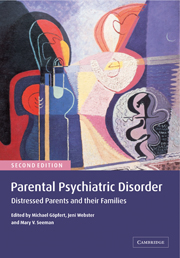Book contents
- Frontmatter
- Contents
- List of contributors
- Foreword
- Preface
- Part I Basic issues
- Part II Comprehensive assessment and treatment
- Part III Specific disorders: the impact on parent–child relationships
- Part IV Specific treatments and service needs
- Part V Child-sensitive therapeutic interventions
- Part VI Models for collaborative services and staff training
- 23 Keeping the family in mind: setting a local agenda for change
- 24 Are services for families with a mentally ill parent adequate?
- 25 Models of service provision in three countries: Marlboro, New Haven, Sydney, Melbourne and Lewisham
- 26 Overcoming obstacles to interagency support: learning from Europe
- 27 Training and practice protocols
- Afterword
- Index
- References
26 - Overcoming obstacles to interagency support: learning from Europe
from Part VI - Models for collaborative services and staff training
Published online by Cambridge University Press: 09 August 2009
- Frontmatter
- Contents
- List of contributors
- Foreword
- Preface
- Part I Basic issues
- Part II Comprehensive assessment and treatment
- Part III Specific disorders: the impact on parent–child relationships
- Part IV Specific treatments and service needs
- Part V Child-sensitive therapeutic interventions
- Part VI Models for collaborative services and staff training
- 23 Keeping the family in mind: setting a local agenda for change
- 24 Are services for families with a mentally ill parent adequate?
- 25 Models of service provision in three countries: Marlboro, New Haven, Sydney, Melbourne and Lewisham
- 26 Overcoming obstacles to interagency support: learning from Europe
- 27 Training and practice protocols
- Afterword
- Index
- References
Summary
The ‘problem’ for families and service providers
When mentally ill people are parents as well as patients, a range of psychological, emotional and social problems are faced by them and their children, as the chapters in this book clearly demonstrate. Negotiating everyday life as well as longer-term concerns can at times be fraught for these families. Whatever their clinical problems, mentally ill parents and their families live in social, economic and legal contexts that contribute to their well-being, or lack of it. Responding appropriately to these families' problems poses difficulties for service providers in health, welfare and social care, who have responsibilities to ensure that needs are met. The concerns that surround these families, which range from those connected to the parent as patient to those of the patient as parent, mean that a number of professionals and agencies are likely to be involved. These problems are not only experienced in the UK. Regardless of differences in structures of service delivery, the problems of cooperation between services and agencies are experienced in some form and to some degree throughout Europe.
Parents with a mental health problem face difficulties in caring for their children that stem from their illness, from social responses to their illness and from a generalized social exclusion. Unemployment, housing problems, poverty and the stigma attached to mental illness increase the pressure on parents whose mental health is fragile. They often struggle financially and they are likely to live in social isolation.
Keywords
- Type
- Chapter
- Information
- Parental Psychiatric DisorderDistressed Parents and their Families, pp. 361 - 374Publisher: Cambridge University PressPrint publication year: 2004
References
- 5
- Cited by



